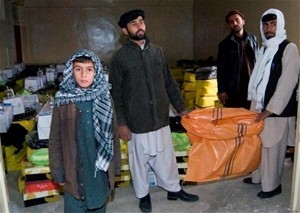
USAID and the Provincial Reconstruction Team provided warm clothing, food, and heaters to victims of a rocket attack in Kapisa.
USAID/LGCD
Tagab district government distributes winterization kits to victims’ families.
4 MAY 2010 | TAGAB DISTRICT, KAPISA PROVINCE, AFGHANISTAN
Shortly after an indiscriminate rocket attack killed 53 civilians in the Tagab district of Kapisa province, the U.S. Government stepped in to help survivors. USAID partnered with the district government and the Kapisa Provincial Reconstruction Team (PRT) to offer condolences to the victims' families and provide them with much-needed humanitarian assistance to sustain them through the winter season.
Food, warm clothing, and heaters were among the items USAID and the Kapisa PRT provided to the district government for distribution to the victims’ families at a shura (community gathering). The shura offered the community a chance to mourn the dead, and permitted top provincial officials and religious leaders to express their solidarity with the community. The newly elected head of the provincial council offered prayers for the victims and joined the local mayor and district governor in thanking USAID and PRT representatives for their assistance.
USAID provided the winterization kits for distribution by the district government through a $10,000 community stabilization grant under the Local Governance and Community Development program (LGCD), USAID’s prime counterinsurgency effort in Afghanistan. The Kapisa PRT supplemented the grant with $5,000 from the Commander's Emergency Response Program (CERP).
By working together to support such quick-impact interventions, USAID and its counterparts provide inputs for resource-strapped district and provincial governments, enabling them to respond quickly to their constituents’ immediate needs.
As USAID’s flagship stabilization effort, the LGCD program works to engage communities in unstable areas to take an active role in their own security. It also addresses priority grievances of at-risk populations through integrated community development projects. Moreover, the project helps to enhance the legitimacy of the local government by enabling government staff to provide support to communities as a means of building trust between the government and its constituents.







Comment
Make a general inquiry or suggest an improvement.